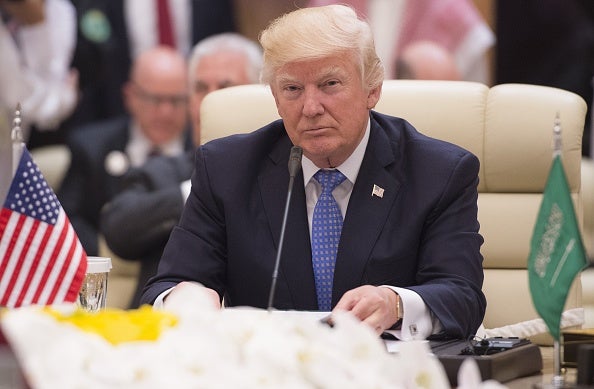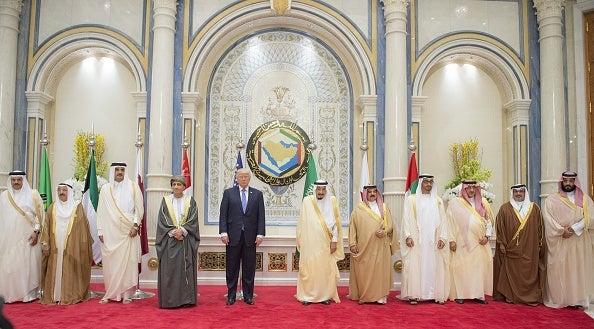Donald Trump tells Saudis that fight against terrorism is a 'battle between good and evil'
The forceful address at the summit in Riyadh omitted the Saudis' war crimes in Yemen

Your support helps us to tell the story
From reproductive rights to climate change to Big Tech, The Independent is on the ground when the story is developing. Whether it's investigating the financials of Elon Musk's pro-Trump PAC or producing our latest documentary, 'The A Word', which shines a light on the American women fighting for reproductive rights, we know how important it is to parse out the facts from the messaging.
At such a critical moment in US history, we need reporters on the ground. Your donation allows us to keep sending journalists to speak to both sides of the story.
The Independent is trusted by Americans across the entire political spectrum. And unlike many other quality news outlets, we choose not to lock Americans out of our reporting and analysis with paywalls. We believe quality journalism should be available to everyone, paid for by those who can afford it.
Your support makes all the difference.Donald Trump said the struggle against violent extremism was a “battle between good and evil” as he urged countries in the Middle East to combat radicalisation.
In the grand King Abdulaziz Conference Centre, with crystal chandeliers and gold-rimmed side tables laden with snacks and sterling silver pens, leaders of 50 Arab and Islamic nations listened to Mr Trump’s first official speech to leaders abroad since his inauguration.
Unlike his predecessor in Cairo in 2009, Mr Trump did not issue the traditional greeting of “As-salamu alaykum”, but insisted he was there to “deliver a message of friendship, hope and love”.
“This is not a battle between different faiths, different sects, or different civilisations,” he told the room.
“This is a battle between barbaric criminals who seek to obliterate human life, and decent people of all religions who seek to protect it. This is a battle between good and evil.”
He promised to show determination to his “enemies” and to fight violent extremism by “gradual reforms”, and would not “seek to impose our [American] way of life on others”.
“But the nations of the Middle East cannot wait for American power to crush this enemy for them,” he said.
The President’s speech, reportedly written by White House aide Stephen Miller, at the Arab Islamic American Summit comes after months of engaging in what critics described as anti-Muslim rhetoric, stoking prejudice against Muslims who lived in the US and around the world.
Mr Trump, who blamed Iran for instability in the Middle East, was welcomed by the Saudi King as a “friend” to his “second home” country of Saudi Arabia, and the King vowed to “confront this scourge [of terrorism] that poses a danger to all of humanity”.
The President previously accused Saudi Arabia of masterminding the 9/11 attacks which killed close to 3,000 people, but made no mention of that at the summit. He also did not mention the atrocities committed in Yemen by Saudi Arabia, as he promoted arms contracts between the US and Saudi Arabia.
“We will be sure to help our Saudi friends to get a good deal from our great American defence companies, the greatest anywhere in the world,” Mr Trump said.
“This will help Saudi Arabia to take a far greater role in defence and security and all roles having to do with security.”

Human Rights Watch campaigners have argued that US officials are at risk of legal liability for human rights violations by selling arms to the Saudis.
Mr Trump also appealed to Saudi Arabia to “let young Muslim men and women create a new prosperity for themselves”.
“We have to let them do it,” he said.
He added that Saudi Arabia and its neighbours had great potential to become a place where “newcomers flock”, instead of creating an exodus of refugees, as well as to become a new centre of economic activity.
He pointed to 9/11 – but did not mention the terrorists' origin – the shootings in an Orlando nightclub last summer and in San Bernardino, as well as the Boston bombings. He acknowledged, however, that Middle Eastern countries had “borne the brunt” of attacks with 95 per cent of terrorism victims being Muslim.
He said Hamas and Hezbollah were also terrorist organisations, like al-Qaeda and Isis, and were responsible for “generations of vanished dreams”.
“Drive them out,” he repeated of the terrorists. “Drive them out, drive them out of this Earth.”
Besides his speech, the President signed a “joint vision statement”, several private sector contracts, and $110 billion (£84.4m) worth of defence cooperation agreements, equating to an investment of around $350 billion (£268.5m) over a decade.
As the attendees waited for the ceremony to start on Sunday, US National Economic Council Director Gary Cohn wandered towards the pool of reporters and told them that the Saudis would “invest a lot of money in the US and have a lot of US companies invest and build things over here... They’re going to hire US companies….a bunch of infrastructure related things… A lot of money. Big dollars. Big dollars.”
Press Secretary Sean Spicer also claimed the Saudi Arabia arms deal was the largest in history and would create thousands of US jobs.
Another main takeaway from the White House was the memorandum of understanding between Secretary of State Rex Tillerson and officials from six Persian Gulf states to prosecute individuals who finance terrorism.
Mr Trump has appointed allegedly anti-Islam aides into the closest circles of the White House, including Stephen Miller, Steve Bannon, Kellyanne Conway and KT McFarland.
He previously said he saw Muslims “cheering and clapping” as the Twin Towers fell, and proposed in December 2015 to ban all Muslims from entering the US.
This intention was scrubbed from Mr Trump’s website after he won the election, but was replaced with an executive order banning immigrants and refugees for at least 90 days from seven Muslim-majority countries. The ban was knocked down by a federal judge in Washington. The replacement ban lifted restrictions from green card holders and Iraqis, but was also struck down by federal courts.
The number of hate crimes and attacks against Muslims spiked by 67 per cent in 2015, noted the FBI, the same year Mr Trump was campaigning for President. In the first three months of 2017, the number of attacks against mosques doubled compared to the same period in 2016.
The attacks led to Khizr Khan, the father of the slain American Muslim solider during the Iraq War, to claim last December that American Muslims’ “fear is real”.
Before Mr Trump returns to the US, he will meet Israeli leaders and the Pope.
In his speech, he was determinedly optimistic about his mission and the message his words would bring. It was difficult to judge leaders’ immediate reactions, watching the rows of deadpan faces in the conference centre.
“With God's help, this summit could be remembered as the beginning of peace in the Middle East and maybe all the world,” Mr Trump declared.
Join our commenting forum
Join thought-provoking conversations, follow other Independent readers and see their replies
Comments